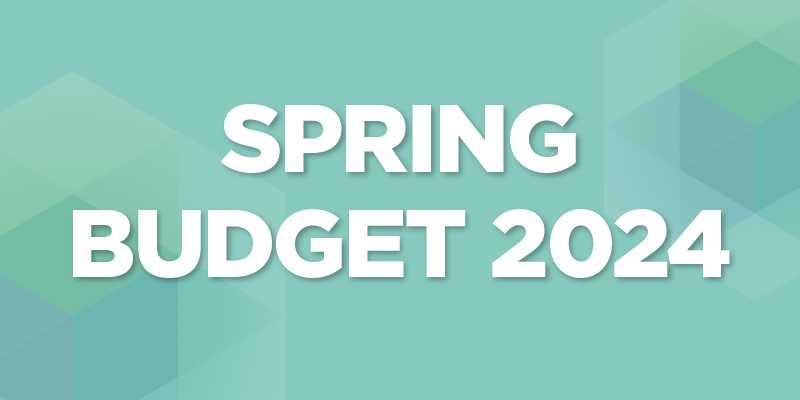News: Spring Budget 2024
8th March 2024

On Wednesday 6th March 2024, chancellor Jeremy Hunt presented his Spring Budget to Parliament and to the whole of the UK.
There was continued focus on the economy and inflation, with reduced inflation allowing the government to make tax cuts in certain areas. Here, we summarise the key points:
National Insurance
It was announced that there would be further cuts to national insurance levels from April 2024:
- Employee’s national insurance – the main rate will be reduced by another 2%, taking it down to 8%.
- Class 4 national insurance – similarly, the main rate will be reduced by 2% as well, taking it down to 6%.
It is estimated that this will save the average employee £900 per year and the average self-employed individual £650 per year when coupled with the reduction to NICs made in the Autumn Statement 2023.
This is being touted as a way of simplifying the UK’s tax system. It remains doubtful whether this approach will really achieve this goal. It seems that the government are looking to remove employee NICs completely; but all future changes are dependent on who is in government.
High Income Child Benefit Charge
In a bid to make the High Income Child Benefit Charge (HICBC) fairer across the board, the government will implement a new system from April 2026, introducing a household income threshold. In the meantime, we will see two changes from April 2024:
- Previously, those individuals with a total income of £50,000 or more were drawn into this charge. This will be increased to £60,000.
- The charge was repayable at 1% per £100 earned over £50,000, meaning those with income of £60,000 or more need to repay the whole amount they had received. This £10,000 taper is now being increased by £20,000 resulting in those with an income of £70,000 repaying 50% of the amount they have received and those with an income in excess of £80,000 would need to repay the amount in full.
This will be welcomed by most families across the UK and is a positive first step to reform legislation that was not working fairly across different households. Those households with one individual working and earning £60,000 a year were entitled to nothing, whereas those households with two workers earning £49,999 a year each were entitled to the full amount.
Furnished holiday letting and residential property gains
The FHL tax regime is to be scrapped in order to make the property system fairer. This will lead to changes to the way profits are calculated each year (mostly affecting capital allowances and finance costs). Those with FHLs may find that a greater portion of their profits become taxable in the coming years.
The removal of the FHL regime will likely also remove the opportunity to claim Business Asset Disposal Relief on the disposal of such properties, meaning that gains may be charged at the higher residential rate, rather than at 10%.
However, there was also a reduction in the higher residential CGT rate, being reduced from 28% to 24%, in a bid to create more movement in the market. This will allow the government to collect more tax by increasing the number of transactions. It’s worth noting that an increase in property sales would also mean more Stamp Duty Land Tax flowing into the treasury.
The government hopes that this will help to ‘level the playing field between short-term and long term-lets’ helping support people to live in their local area. However, a removal of the tax benefits of an FHL may lead to some investors holding onto those properties for longer as the tax burden is simply too much or just more than they are willing to pay.
VAT registration threshold
The VAT registration threshold will be increased from £85,000 to £90,000. This will help more small businesses remain below the threshold, allowing those around the threshold to keep more of their profits without having to increase the prices of their products and services.
Other notable announcements in the Spring Budget 24′ include:
- Fuel duty – this has been frozen for a further 12 months, in order to help with the cost of living crisis.
- Alcohol duty – this will also be frozen further, until 1st February 2025.
- Non-domiciled individuals – there will be reform to the ‘non-dom’ charges that apply, with the new system applying residency tests. This will allow the government to collect higher taxes on wealthy individuals that remain in the UK, regardless of where they claim their domicile is. Those who are ‘non-dom’ but resident in the UK for four years will pay UK taxes on their income, regardless of their domicile status. There will be a transitional period for those already in the UK.
- HMRC funding – the government will continue to invest further in HMRC, in order to ensure that everyone pays the right amount of tax. It is expected that they will be able to raise a further £4.5b by 2028/29.
- The New UK ISA – this will encourage individuals to invest their savings in UK businesses by allowing them additional ISA savings allowances each year.
- Additional funding for public sector infrastructure – mainly, the announcement of funding to introduce new and improved IT systems for the NHS, worth £3.4b. It is hoped that this will help reduce time spent on administrative tasks.
- Creative arts – the government has announced new tax reliefs for eligible film studios, as well as providing more funding for theatres, museums, orchestras and galleries.
In conclusion, the government believes that the UK economy is now starting to turn a corner and the Chancellor Jeremy Hunt said they will continue to stick to their plan in order to halve inflation, grow the economy and get debt falling!
If you’d like to find out more about how these changes could affect you, contact your accountant who would be happy to talk through your situation.
